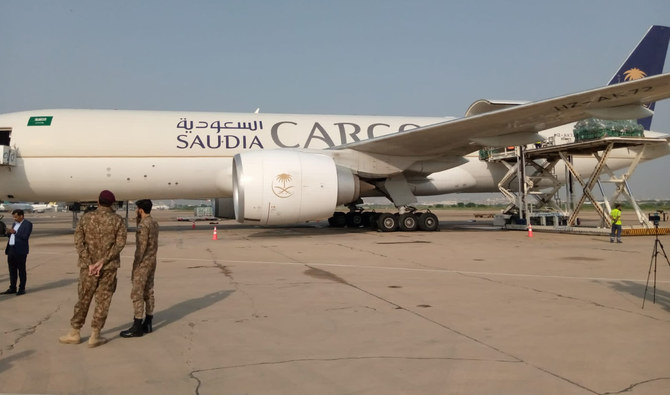KARACHI: Two planes carrying Saudi humanitarian aid landed in Karachi on Tuesday evening and Wednesday morning respectively, as Pakistan reels from record monsoon rains that have triggered floods across the country, killing more than 1,400 people.
Pakistan estimates the damage at $30 billion, and both the government and the UN, whose chief toured flood-hit areas last week, have blamed the flooding on climate change.
Tuesday’s assistance by KSrelief (King Salman Humanitarian Aid and Relief Center), the first consignment of aid from the kingdom, was received at Karachi’s Jinnah International Airport by Saudi Ambassador Nawaf bin Saeed Al-Malki, Saudi Consul General in Karachi Bandar Fahad A. Al Dayel, Pakistani minister for labor Saeed Ghani and other officials of the ministry of foreign affairs as well as officers of the Pakistan Army.
Speaking to Arab News, Ambassador Al-Malki said more aid flights from the kingdom would arrive on Wednesday.
“First stage was urgent support, second was to start an air-bridge of humanitarian support and at the third stage, a national campaign has been kicked off for the support of our Pakistani brothers,” Al-Malki said.
He said the kingdom would assess damages through KSrelief. Hundreds of trucks loaded with support, Al-Malki added, would be sent to flood-hit areas through the National Disaster Management Authority (NDMA) on the coming Monday.
“The custodians of the holy mosque, King Salman and Crown Prince Muhammad Bin Salman, are keen about [helping] the Pakistani people. Saudi Arabia will always be standing with Pakistan in difficult situations,” he said. “We are proud as the Muslim country and leader of the Ummah to [lend] our support to brother Pakistan.”
Provincial minister Saeed Ghani said he was thankful to the Saudi government as well as King Salman and Crown Prince Muhammad Bin Salman on behalf of the government and people of Pakistan.
“Saudi Arabia has [always] proved in all testing time that it is a brotherly country,” he told Arab News, adding that two planes from the kingdom would now daily bring aid from Saudi Arabia for the people of Pakistan.
“Most importantly, the Saudi government has committed to support the rehabilitation and reconstruction of the affected areas and I think this is big support that the Pakistani people need from the brotherly country,” the minister said. “This support will definitely strengthen the relationship between Pakistan and Saudi Arabia.”
Rains in Pakistan started in mid-June, sweeping away entire villages, bridges and roads and leaving hundreds of thousands homeless. At one point, a third of the country’s territory was said to be under water.
Authorities said the overall death toll reached 1,481 on Tuesday, with 54 more people dying in rain-related floods in the past 24 hours, with the majority of those deaths in the hard-hit province of Sindh.
Sherry Rehman, Pakistan’s minister for climate change, warned that the rains, which had abated late last month only to restart this week, are predicted to continue lashing much of the country in the coming weeks.
Rehman also expressed fears the downpours would hamper ongoing rescue and relief operations in flood-hit areas, where swirling deluges from overflowing rivers, fast melting glaciers and floods have already affected 33 million people.
So far, rescuers have evacuated 179,281 people from flood-hit areas.
It will take up to six months to drain water in flood-hit areas, officials say. Waterborne diseases have already sickened thousands of people in flood-stricken areas — and now there are fears of mosquito-borne dengue fever. Mosquitos have spread, due to stagnant waters following the flooding.
The floods have also destroyed crops, including 70 percent of the onion harvest, along with rice and corn, Rehman has said. Much of the country’s agriculture belt is underwater and Pakistan is in talks with several nations to import wheat. Iran has already dispatched fresh vegetables to Pakistan.
The floods have damaged 1.7 million homes, according to the National Disaster Management Agency. Thousands of pregnant women are living in tents and makeshift homes.
Initially, Pakistan estimated that the floods caused $10 billion in damages, but authorities now say the damages are far greater. The devastation has forced the United Nations to urge the international community to send more help.
So far, UN agencies and various countries, including the United States, have sent about 90 plane loads of aid. Last week, US Secretary-General Antonio Guterres traveled to flood-hit areas in southern and southwestern Pakistan to see first-hand the extent of the disaster.
“I appeal for massive support from the international community as Pakistan responds to this climate catastrophe,” Guterres tweeted from Pakistan.
Earlier, he had called on the world to stop “sleepwalking” through the dangerous environmental crisis.
















